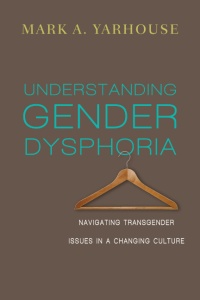A male-to-female transsexual Christian, who I will refer to as Sara, opened an exchange with me with a reflection on her decision to pursue hormonal treatment and sex reassignment surgery: “I may have sinned in the decisions I made; I’m honestly not sure that I did the right thing. At the time, I felt excruciating distress. I thought I would take my life. I can’t imagine going back. What would have me do?”
That is a pretty disarming exchange. This is not someone who has made a commitment to a worldview and philosophy bent on deconstructing meaningful categories of sex and gender. If you had come to argue with Sara about a sexual ethic, you would not have found an opponent. She might have agreed with you, in fact. How does a person like Sarah maintain a posture of repentance and a soft heart toward God in light of the impossible decisions she faced? Is there a Christian community that is willing to stand next to her in these impossible circumstances?
As a psychological condition, Gender Dysphoria is such a rare condition that we little good research from which to draw strong conclusions. I have known people like Sara who experienced gender incongruence and a rise in the associated distress so strongly that they felt that nothing less than their sanity and their life was at stake. They desperately sought a resolution. This is not an argument that they then should pursue the most invasive procedures or cross-gender identification, but I also acknowledge that I understand and empathize with that decision, as painful as it often is.
 I am going to start a series titled Understanding Gender Dysphoria in anticipation of a forthcoming book that is scheduled to be published by InterVarsity Press Academic in July of 2015. It is titled Understanding Gender Dysphoria: Navigating Transgender Issues in a Changing Culture. In it I define key terms and explore the experiences of those who are accurately diagnosed with Gender Dysphoria and discuss some of the controversies in prevention and resolution of gender identity conflicts, as well as offer an integrated framework for how Christians might respond.
I am going to start a series titled Understanding Gender Dysphoria in anticipation of a forthcoming book that is scheduled to be published by InterVarsity Press Academic in July of 2015. It is titled Understanding Gender Dysphoria: Navigating Transgender Issues in a Changing Culture. In it I define key terms and explore the experiences of those who are accurately diagnosed with Gender Dysphoria and discuss some of the controversies in prevention and resolution of gender identity conflicts, as well as offer an integrated framework for how Christians might respond.
Here is the description from IVP Academic:
Few topics are more contested today than gender identity. In the fog of the culture war, complex issues like gender dysphoria are reduced to slogans and sound bites. And while the war rages over language, institutions and political allegiances, transgender individuals are the ones who end up being the casualties.
Mark Yarhouse…challenges the church to rise above the political hostilities and listen to people’s stories. In Understanding Gender Dysphoria, Yarhouse offers a Christian perspective on transgender issues that eschews simplistic answers and appreciates the psychological and theological complexity. The result is a book that engages the latest research while remaining pastorally sensitive to the experiences of each person.
In the midst of a tense political climate, Yarhouse calls Christians to come alongside those on the margins and stand with them as they resolve their questions and concerns about gender identity. Understanding Gender Dysphoria is the book we need to navigate these stormy cultural waters.
This is a difficult topic for many people. Evangelical Christians, in particular, are not adequately prepared to meaningfully engage the topic of Gender Dysphoria today. What interests me most is the opportunity to help individual Christians (pastors, parents, friends) and the church position themselves to help those who are navigating the difficult terrain of gender identity concerns and engage the topic in a more constructive manner.
If the topic interests you, the book can be pre-ordered through IVP or Amazon. In the meantime, join me in a discussion of Gender Dysphoria over the next several months. Also, if you are in the Grand Rapids, MI, area, join me at Calvin College on February 5th as I’ll be speaking on Gender Dysphoria for their Sexuality Series.

Look forward to reading this work, Dr. Yarhouse. Thanks for your contributions. Stay at it!
What impossible decisions did Sara face? What impossible circumstances did she find herself in? For that matter, what is an impossible decision or circumstance anyway?
Dr. Yarhouse, thank you for you faithful, wise and kind approach to this vexing human condition. You mentioned there are no widely agreed on theories about what “causes” gender confusion folks like Sara experience. Do you know of any research done on the impact of attachment to this issue?
There has been some, but it’s limited. I believe I cited what was available in Understanding Gender Dysphoria, the chapter on causation.